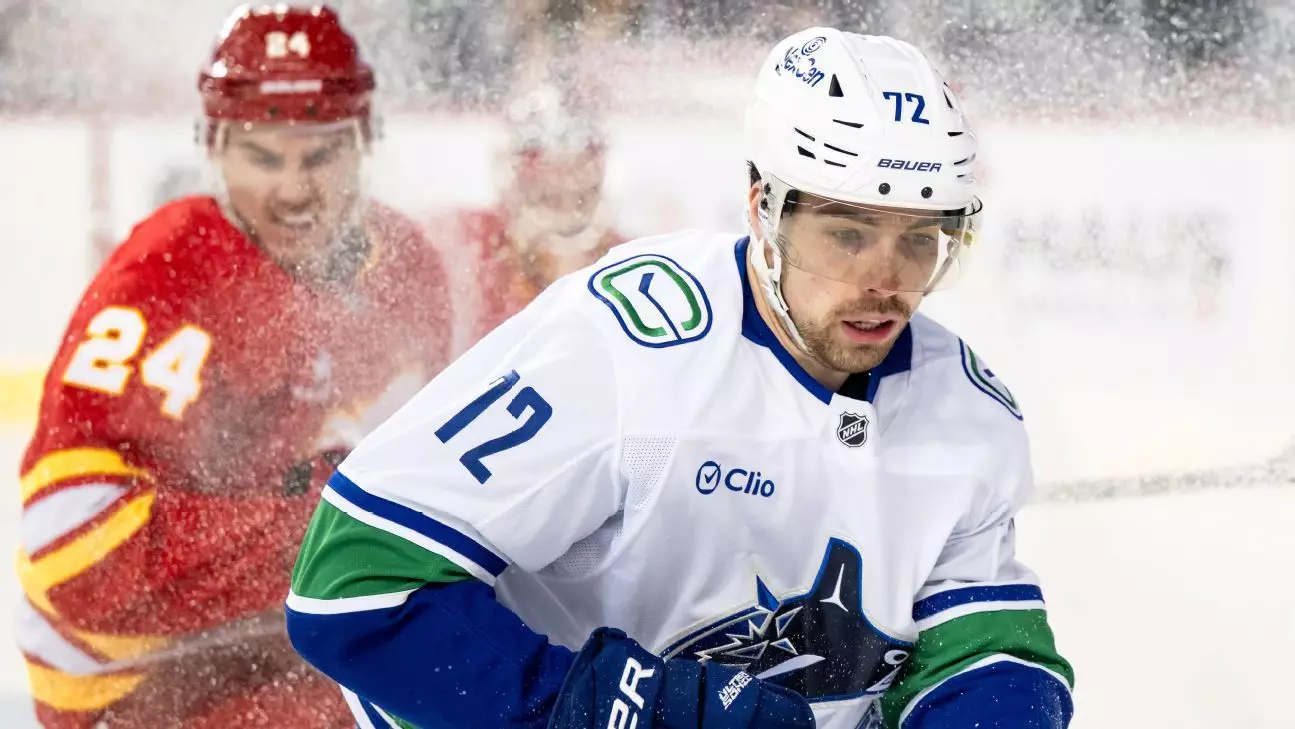In the competitive world of the NHL, the ability to overcome adversity is frequently the defining attribute of a successful team. This year, however, the Vancouver Canucks find themselves embroiled in a season riddled with injuries and uncertainties, particularly surrounding their center, Filip Chytil. Initially acquired as part of a trade that sent J.T. Miller to the New York Rangers, Chytil’s tenure with the Canucks has been marked by challenges, climaxing with his recent struggle to recover from a concussion sustained on March 15.
Chytil’s situation underscores the precarious nature of professional sports, where every hit may carry the potential for long-term ramifications. With phrases like “good days and bad days” rolling off the tongue of head coach Rick Tocchet, it becomes painfully clear that Chytil is not just grappling with his physical health but also with the emotional weight that accompanies a history of concussions. The road to recovery is often fraught with setbacks, and for an athlete like Chytil, who articulates that “the bad days aren’t as bad,” this faint glimmer of hope may offer a crucial psychological advantage.
The Ripple Effect of Injuries
What compounded the trouble for the Canucks is not an isolated incident involving Chytil alone; it’s a broader narrative of a team grappling with a host of injuries. Star center Elias Pettersson’s absence since March 22, the captain Quinn Hughes’ lower-body injury, and Brock Boeser’s temporary concussion have created a landscape of uncertainty. The compounded impact of these injuries is difficult to overstate; they shake the foundation of teamwork and trust that is vital for any successful franchise.
Tocchet’s candid reflections illustrate a depth of concern that goes beyond mere statistics. When injuries pile up, teams not only lose their star players but also their stability and confidence. These issues are magnified in a playoff race that sees the Canucks vying against formidable opponents like the Minnesota Wild and St. Louis Blues for the final playoff spots. Each game transforms into a challenge to band together and execute under pressure, even when the odds may seem insurmountable.
Culture and Commitment: The Heart of the Team
While the injuries could easily derail team morale, the response from the Canucks showcases a fighting spirit that transcends individual statistics. Goalkeeper Thatcher Demko’s statements about the team’s commitment embody a culture of resilience, one where players are stepping up to face the reality of their challenges rather than conceding defeat. Statements like, “we’re not using it as an excuse” reflect a psychological fortitude that can often be the difference between a team that succeeds and one that collapses under pressure.
However, for a culture to truly flourish, it requires buy-in from every player involved. This season has compelled the Canucks to ask profound questions about their identity as a team: Who is all in? What does it mean to fight through adversity? These existential queries create an opportunity for players to redefine their commitment to the game and to one another. The effects of this evolving culture can sometimes manifest in unexpected ways—previously underperforming players may rise to the occasion, driven by a collective will to succeed.
The Future: A Glimpse of Hope
Despite the current season being marred by injuries and uncertainty, the overarching narrative in Vancouver can pivot toward the future with cautious optimism. Chytil, when healthy, may prove pivotal in rejuvenating the Canucks’ offense, and the time taken to recover could ultimately serve to extend his career in the long run. While immediate playoff aspirations hang in the balance, the Canucks’ ability to build a solid team culture offers the opportunity to emerge stronger.
Navigating through this storm requires not just grit but also strategic planning for the future. The Canucks will need to assess their roster depth, evaluate their player development strategies, and perhaps reconsider their approach to player injuries moving forward. There is no doubt that the toll of facing significant injuries is heavy, but it also serves as a fertile ground for growth, resilience, and ultimately, transformation within the squad. How the Canucks choose to embrace these challenges may well shape the trajectory of the team for seasons to come.

